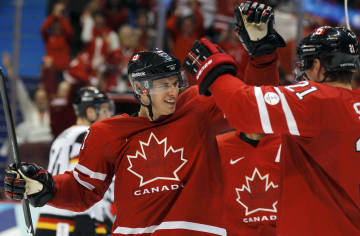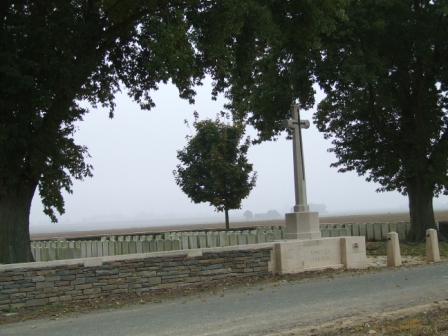Canada 3, USA 2 — In overtime
Daily Archives: February 28, 2010
Hockey Night (and Afternoon) in Canada
httpv://www.youtube.com/watch?v=lMf2fAXPS1Q
In all the excitement of a gold medal rematch between Canada and the USA today, it’s hard not to wring the last bit of lingering excitement from two longstanding hockey cliches: Paul Henderson’s winning goal against the Soviets in ’72 (above), and the American “Miracle on Ice” against the Soviets in ’80 (after the jump).
The Soviets. Cold War, Mutual Assured Destruction (or, the Strangelovian acronym, MAD), and perennial “strategic arms” negotiations — not to mention those recurring classic hockey “summits.”
Frye and War Literature
Manitoba Cemetery, Somme, France, where Frye’s brother Howard (killed in action 18 August 1918) is buried. It is worth noting that Canada’s last known First World War veteran died just this past week — John Babcock, who enlisted at age 15 and died aged 109.
Responding to Peter Webb’s post and a subsequent exchange in the Comments:
Peter, I don’t by any means think that Frye’s biography explains the general absence of attention to war stories in his writing, but his own painful experiences might have caused him to cast his glance elsewhere.
In 1944 he did review Joseph Schull’s I, Jones, Soldier, a narrative poem, about which he said: “describe[es] the thoughts in the mind of an officer just before zero hour. Jones is a sensitive soldier, and is not content to go into action with a merely physical integration; he wants a spiritual one, too, and some insight into the fundamental faiths which are the laws of his own being and consequently the causes of his being there. He reviews his military career up to that point with a good deal of detachment and humour, and rejects the ready-made formulas—patriotism, justice of one’s cause, product of a Depression generation, and the rest—with a sharp insight. When he gets down to his mental bedrock, he finds ‘one earth, one Man, one Truth’ [48]: perhaps in answer, though the poet does not say so, to the ‘Ein Reich, ein Volk, ein Führer’ with which he is challenged by his enemy. These are of course inarticulate ideas, and he talks very vaguely about them, but fundamental ideas usually are inarticulate, and the poem does not lose its narrative logic.”
Frye reviewed as well, also in 1944, Karl Shapiro’s V-Letter and Other Poems. Shapiro, Frye writes, “is not a ‘war’ poet: he is simply a poet who happens to be in the army, and because he is a poet patterns go on forming and metres go on clicking in his mind, regardless of what else is happening [vi]. Sometimes, of course, the war enters the poetry—most poignantly, perhaps, in the poem on the amputation [The Leg]—but on the whole Mr. Shapiro makes no attempt to ‘interpret’ the war to us by composing metrical editorials.”
I think the only time Frye glanced at war from the Nazi point of view was in his review of Ernst Jünger’s On the Marble Cliffs (reprinted in Northrop Frye on Modern Culture), but it’s clear that he doesn’t know quite what to make of Jünger’s allegory.

